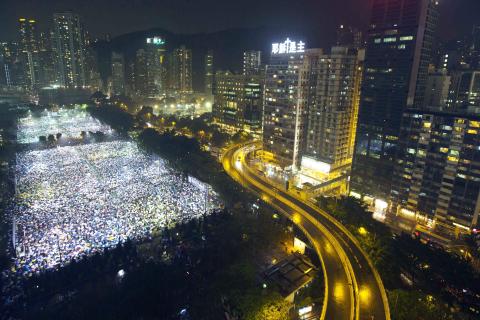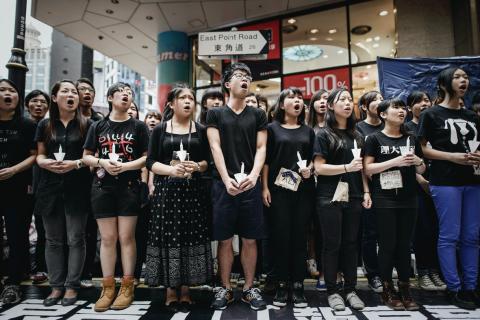Tens of thousands of Hong Kongers braved thunder and a torrential downpour to attend a candlelight vigil yesterday marking the 24th anniversary of China’s bloody Tiananmen crackdown, as Beijing blocked commemoration attempts.
A massive turnout filled the former British colony’s Victoria Park in an annual act of remembrance for the hundreds, perhaps thousands, of people killed in the June 4 and 5 onslaught in Beijing in 1989.
In Beijing, police blocked the gate of a cemetery housing victims of the crackdown on pro-democracy demonstrators as part of a sweeping annual effort to bar commemorations.

Photo: Reuters
In a narrow street near Beijing’s Forbidden City, security personnel patrolled outside the former house of Zhao Ziyang (趙紫陽), the former Chinese Communist Party secretary who was purged and held under house arrest for perceived sympathy with the protesters.
Chinese authorities also blocked online searches for a wide range of keywords ranging from “Tiananmen” to “candle” on Sina Weibo (新浪微博), China’s version of Twitter.
Hong Kong and Macau, which reverted to Beijing’s rule in the late 1990s but have semi-autonomous status, are the only places in China where the brutal military intervention is openly marked.

Photo: AFP
The event has largely been expunged from official Chinese history, but Victoria Park was transformed yesterday into a sea of demonstrators holding candles.
“Vindicate June Fourth,” protesters shouted. “We will never forget.”
“The candlelight vigil tonight has an additional meaning of not just condemning the massacre 24 years ago, but also condemning the suppression today [in China],” said Lee Cheuk-yan (李卓人), chairman of protest organizers the Hong Kong Alliance in Support of Patriotic Democratic Movements of China.
Billy Li, a 28-year-old recent university graduate, said he was attending because the Tiananmen crackdown “has not been vindicated, because the truth has not been told.”
Organizers had said they expect 150,000 people to attend the event, including an increasing number of mainland Chinese. No estimate of the crowd size was immediately available.
“I hope the next generation will not have to suffer the red terror,” 42-year-old Pan Xidian from the Chinese city of Xiamen said.
“We have not given up,” the construction worker said, adding that it he was very thankful for Hong Kongers’ support.
Pan had traveled to Hong Kong for the first time to commemorate the crackdown that ended weeks of nationwide democracy protests.
Beijing has never provided an official final toll for the military repression, which was condemned worldwide. Independent observers tallied more than 1,000 dead in Beijing, without including victims elsewhere.
“I think all of us, even the new generation in Hong Kong, would have the same feeling that it is a tragedy and also an offense by the government to shoot people like that,” said Richard Choi, vice chairman of the organizing group.
“The problem is still not resolved, that’s why Hong Kong people have the same feelings and the same demands as they did 24 years ago,” he said.
The Chinese Communist Party branded the Tiananmen protests a “counterrevolutionary rebellion,” and each year Beijing pushes to prevent commemorations.
However, pro-democracy advocates in Hong Kong have marked the event every year. Organizers said 180,000 people took part last year, while police put the figure at 85,000.

CHAOS: Iranians took to the streets playing celebratory music after reports of Khamenei’s death on Saturday, while mourners also gathered in Tehran yesterday Iranian Supreme Leader Ayatollah Ali Khamenei was killed in a major attack on Iran launched by Israel and the US, throwing the future of the Islamic republic into doubt and raising the risk of regional instability. Iranian state television and the state-run IRNA news agency announced the 86-year-old’s death early yesterday. US President Donald Trump said it gave Iranians their “greatest chance” to “take back” their country. The announcements came after a joint US and Israeli aerial bombardment that targeted Iranian military and governmental sites. Trump said the “heavy and pinpoint bombing” would continue through the week or as long

TRUST: The KMT said it respected the US’ timing and considerations, and hoped it would continue to honor its commitments to helping Taiwan bolster its defenses and deterrence US President Donald Trump is delaying a multibillion-dollar arms sale to Taiwan to ensure his visit to Beijing is successful, a New York Times report said. The weapons sales package has stalled in the US Department of State, the report said, citing US officials it did not identify. The White House has told agencies not to push forward ahead of Trump’s meeting with Chinese President Xi Jinping (習近平), it said. The two last month held a phone call to discuss trade and geopolitical flashpoints ahead of the summit. Xi raised the Taiwan issue and urged the US to handle arms sales to

BIG SPENDERS: Foreign investors bought the most Taiwan equities since 2005, signaling confidence that an AI boom would continue to benefit chipmakers Taiwan Semiconductor Manufacturing Co’s (TSMC, 台積電) market capitalization swelled to US$2 trillion for the first time following a 4.25 percent rally in its American depositary receipts (ADR) overnight, putting the world’s biggest contract chipmaker sixth on the list of the world’s biggest companies by market capitalization, just behind Amazon.com Inc. The site CompaniesMarketcap.com ranked TSMC ahead of Saudi Aramco and Meta Platforms Inc. The Taiwanese company’s ADRs on Tuesday surged to US$385.75 on the New York Stock Exchange, as strong demand for artificial intelligence (AI) applications led to chip supply constraints and boost revenue growth to record-breaking levels. Each TSMC ADR represents

State-run CPC Corp, Taiwan (CPC, 台灣中油) yesterday said that it had confirmed on Saturday night with its liquefied natural gas (LNG) and crude oil suppliers that shipments are proceeding as scheduled and that domestic supplies remain unaffected. The CPC yesterday announced the gasoline and diesel prices will rise by NT$0.2 and NT$0.4 per liter, respectively, starting Monday, citing Middle East tensions and blizzards in the eastern United States. CPC also iterated it has been reducing the proportion of crude oil imports from the Middle East and diversifying its supply sources in the past few years in response to geopolitical risks, expanding